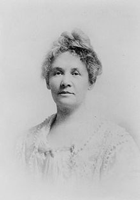Alice Brown
Alice Brown Poems
Through all the wind-blown aisles of May,
Faint bells of perfume swing and fall.
Within this apple-petalled wall
...
WITHDRAW thee, soul, from strife.
Enter thine unseen bark,
And sail across the dark,
The silent sea of life.
...
O LIVING image of eternal youth!
Wrought with such large simplicity of truth
That, now the pattern’s made and on the shelf,
...
O swift forerunners, rosy with the race!
Spirits of dawn, divinely manifest
Behind your blushing banners in the sky,
...
Then, lady, at last thou art sick of my sighing.
Good-bye!
So long as I sue, thou wilt still be denying?
Good-bye!
...
O hearken, all ye little weeds
That lie beneath the snow,
(So low, dear hearts, in poverty so low!)
The sun hath risen for royal deeds,
...
Sweet is the time for joyous folk
Of gifts and minstrelsy;
Yet I, O lowly-hearted One,
Crave but Thy company.
...
Thou wilt not look on me?
Ah, well! the world is wide;
The rivers still are rolling free,
Song and the sword abide;
...
Seal thou the window! Yea, shut out the light
And bar my door to all the airs of spring.
Yet in my cell, concealed from curious sight,
...
Alice Brown Biography
Alice Brown (December 5, 1856 – June 21, 1948) was an American novelist, poet and playwright, best known as a writer of local color stories. She also contributed a chapter to the collaborative novel, The Whole Family (1908). She was born in Hampton Falls, New Hampshire and graduated from Robinson Seminary in Exeter in 1876. She later worked as a schoolteacher, but moved to Boston to write full-time in 1884. She first worked at the Christian Register and then, starting in 1885, the Youth's Companion. She was a prolific author for many years, but her popularity waned after the turn of the century. She produced a book a year until she stopped writing in 1935. She corresponded with Rev. Michael Earls of Holy Cross College and with Father J. M. Lelen of Falmouth, Kentucky, with whom she also exchanged poems. Yale University and Holy Cross now have the only sizable collections of her letters, since she ordered that most of her personal correspondence should be destroyed after her death. Brown died in Massachusetts in 1948. Works: Fools of Nature (1887) The Rose of Hope (1896) The Day of his Youth (1897) Tiverton Tales (1899) Margaret Warrener (1902) The Story of Thyza (1909) John Winterbourne's Family (1910) Golden Baby (1910) The One-Footed Fairy (1911) The Secret of the Clan (1912) Robin Hood's Barn (1913) Vanishing Points (1913) Children of Earth (1915) Bromley Neighborhood (1917) The Prisoner (1916) The Flying Teuton (1918) Homespun and Gold (1920) The Wind Between the Worlds (1920) One-Act Plays (1921) Louise Imogen Guiney — a Study (1921) The Old Crow (1922) Ellen Prior, verse (1923) The Kingdom in the Sky (1932))
The Best Poem Of Alice Brown
A Benedictine Garden
Through all the wind-blown aisles of May,
Faint bells of perfume swing and fall.
Within this apple-petalled wall
(A gray east, flecked with rosy day)
The pink laburnum lays her cheek
In married, matchless, lovely bliss,
Against her golden mate, to seek
His airy kiss.
Tulips, in faded splendor drest,
Brood o'er their beds, a slumbrous gloom.
Dame Peony, red and ripe with bloom,
Swells the silk housing of her breast.
The Lilac, drunk to ecstasy,
Breaks her full flagons on the air,
And drenches home the reeling bee
Who found her fair.
O cowled Legion of the Cross,
What solemn pleasantry is thine,
Vowing to seek the life divine
Through abnegation and through loss!
Men but make monuments of sin
Who walk the earth's ambitious round;
Thou hast the richer realm within
This garden ground.
No woman's voice takes sweeter note
Than chanting of this plumed choir.
No jewel ever wore the fire
Hung on a dewdrop's quivering throat.
A ruddier pomp and pageantry
Than world's delight o'erfleets thy sod;
And choosing this, thou hast in fee
The peace of God.
